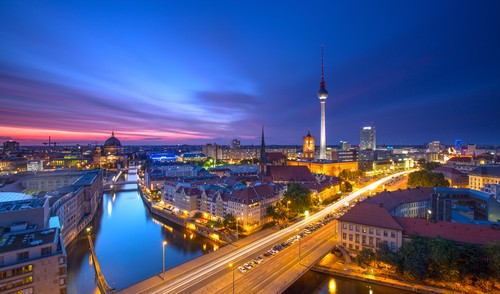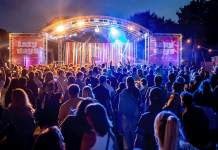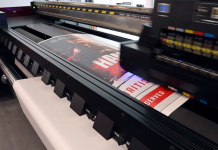Meeting people and sharing ideas are part of what makes us human. It feels like we’re hardwired to seek out networking opportunities. However, whether or not we find those opportunities can depend on where we live.
Networking lets us cultivate contacts, raise our profiles, foster collaborations, and uncover opportunities. When we set out to achieve those things, it’s good to know if we’re in the right place to make those all important connections. Moreover, does the city we live in have the culture and resources in place to facilitate those connections?
Join us as we embark on a journey to unveil the best cities worldwide for networking. From bustling capitals to hidden gems, these cities offer the perfect ecosystem for encouraging connections and nurturing friendships that make working life more enjoyable and more fruitful. On the other slide of the coin, we’ll also look at cities where resources associated with networking are lacking, making it more challenging to mingle with your peers.
London and Berlin rank top for best cities for networking
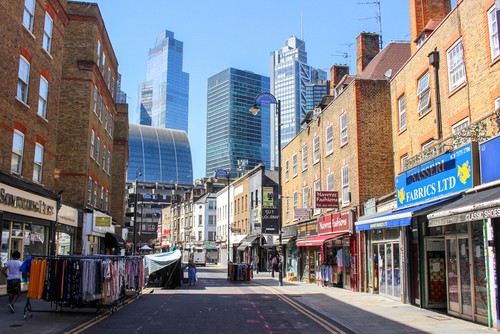
In assessing the networking potential of cities worldwide, we collected statistics around the major factors that contribute to a conducive networking culture. With some clever number crunching, we were able to create a unique index that ranks major global cities from best to worst in terms of networking possibilities.
We compiled the ranking based on factors such as networking events, rentable event spaces, coworking availability, wi-fi speeds, and to lubricate proceedings, we even factored in the price of a beer.
| Rank | City | Number of networking events per city | Number of trade fairs per city | Number of coworking spaces with community events | The number of rentable venues per city | The number of hotels per city | Average wifi speed (mbps) | The cost of a beer |
|---|---|---|---|---|---|---|---|---|
| 1 | London | 2851 | 72 | 176 | 1939 | 2489 | 16 | £6.02 |
| 2 | Berlin | 810 | 153 | 66 | 114 | 711 | 19 | £3.44 |
| 3 | New York | 1107 | 46 | 187 | 994 | 431 | 50 | £6.29 |
| 4 | Tokyo | 805 | 90 | 65 | 77 | 1911 | 27 | £2.77 |
| 5 | Istanbul | 350 | 102 | 33 | 59 | 4125 | 6 | £2.33 |
| 6 | Washington | 1497 | 6 | 81 | 663 | 212 | 106 | £6.29 |
| 7 | Singapore | 714 | 61 | 87 | 96 | 346 | 102 | £5.86 |
| 8 | Paris | 637 | 89 | 55 | 180 | 2564 | 19 | £6.01 |
| 9 | Hong Kong | 261 | 52 | 140 | 76 | 425 | 87 | £5.02 |
| 10 | Bangkok | 541 | 58 | 64 | 22 | 1942 | 28 | £1.81 |
London comes top with an astounding 2,851 networking events per day, offering professionals an unparalleled platform to connect and establish valuable connections. Berlin, on the other hand, scores top marks when it comes to hosting trade fairs, propelling the German capital to 2nd place over all.
Berlin In bronze position is New York. The big apple proved itself to be a strong all-rounder with great events and facilities, and a particular abundance of coworking spaces. All three of these cities provide professionals with fantastic opportunities to collaborate, network, and access a dynamic community of like-minded individuals.
However, if bonding over a beer is a priority, Bangkok sneaks into the number 10 spot offering a very reasonable £1.81 on average for a well-earned pint.
The worst cities in the world for networking
At the other end of the spectrum, we looked at the cities that didn’t score so highly. The results were surprising, with cities known for commerce and entrepreneurship appearing high in the list.
| Rank | City | Number of networking events per city | Number of trade fairs per city | Number of coworking spaces with community events | The number of rentable venues per city | The number of hotels per city | Average wifi speed (mbps) | The cost of a beer |
|---|---|---|---|---|---|---|---|---|
| 1 | Doha | 54 | 4 | 0 | 12 | 165 | 10 | £9.12 |
| 2 | Abu Dhabi | 154 | 16 | 4 | 15 | 267 | 8 | £9.63 |
| 3 | Dublin | 203 | 4 | 28 | 86 | 190 | 47 | £5.15 |
| 4 | Rome | 275 | 3 | 29 | 96 | 2829 | 13 | £4.29 |
| 5 | Osaka | 283 | 20 | 12 | 25 | 1286 | 20 | £2.49 |
Two Gulf State capitals come bottom of our rankings: Doha in Qatar and Abu Dhabi in the UAE. While we don’t expect cities in this part of the world to serve cheap beer, it is their seeming lack of accessible events and facilities that factor significantly in their low scores.
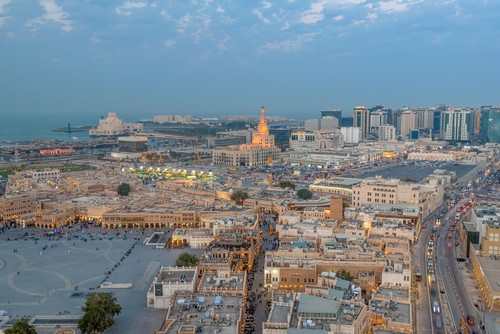
Of course, we know that a lot of business gets done in these cities. According to Expatica.com, the networking culture in Doha often centres around high-level groups including the Qatari Businessmen Association, the American Chamber of Commerce in Qatar and the Qatar Chamber, with similar groups also very active in Abu Dhabi.
While groups like these are keeping the wheels turning in the upper echelons, it may be that they have some catching up to do when it comes to facilitating access to grassroots networking.
Expert tips for networking successfully
We have spoken to Cameron MacArthur, CEO and founder of AI insurance to give us his top tips for networking aucessfully;
-
Be Outgoing
“You have to put yourself out there and be willing to start a conversation. Two of the most senior engineers on our team came from a connection to someone I met by stopping them as they walked by in our office and saying “Hi, I haven’t met you before, what’s your name?””
-
Check in
“I think people over-index on adding new connections to their network instead of strengthening the relationships they have. Take the time to notice when people have work or life events happen (LinkedIn is great for this) and reach out to them to check in. Calling people during your transit time (like walking to the shops) is a great way to do this.”
-
Show gratitude
“If someone goes out of their way to help you, a hand-written thank you note goes a really long way. Much further than a text or an email!”
-
Get specific about your problems
“In my experience, people are really unresponsive to “I want to join your network” or “I want you to mentor me” because those are vague and meaningless asks. But, people like solving problems. I’ve found that going to someone already in your network or even someone new with “I have this very specific problem, here’s what I’m planning on doing about it. You’re uniquely situated to give advice here because of XYZ, what do you think?”, is a great way to strengthen bonds and regularly segues into “you know who you should talk to? My friend: ….””
-
Actually Listen
“When you meet someone, or reconnect with someone, challenge yourself to really pay attention. Be the person who’s good with names when you meet someone new (there are tricks!) and be the friend who remembers what people tell you. Follow up with them later to check in when you give them a call a month down the road.”
Expert tips on how to use promotional materials at networking events
Having something to hand to a new contact creates a tangible reminder of your professional identity and what you represent. Here are some expert tips about how incorporating printed and personalised materials can solidify the impression you make at networking events.
Business Cards
Stock up
Networking etiquette pretty much dictates that you keep a healthy supply of Business Cards on you at all times. If someone hands you a Business Card, you’ll want to be able to reciprocate with your own.
Creative design
Design cards that reflect your brand. They should capture the imagination while maintaining consistent fonts, colours and, of course, essential contact information.
Quality card
Choose a high-quality paper stock to convey professionalism. Matt, gloss or velvet laminated cards will add a feeling of quality as well as durability. Alternatively, take a more rustic approach with Brown Kraft.
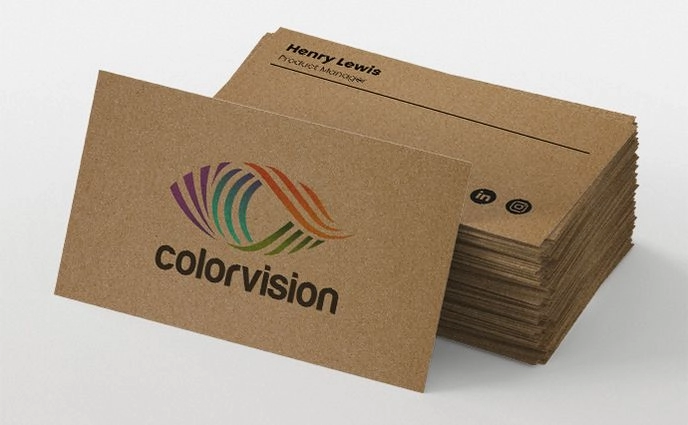
Finish with a flourish
Consider special finishes like foiling or spot UV coating to make your cards stand out, or Triple Layer Business Cards that allow you to give a hint of colour with your central layer.
Unique attributes. Incorporate design features like QR codes or unique shapes to spark conversations and enhance memorability.
Brochures and Flyers
Brief Brochures
Keep Brochures and Flyers concise. Focus on key messages, avoiding large blocks of text and unnecessary information. Hit the key points and you can always discuss the finer details later.
Image conscious
Use engaging visuals and clear headings for easy readability. Visual content is processed quickly by the reader’s mind, leaving a strong initial impact and inspiring them to delve more deeply into your brochure.
A call to action
You’ve shown your readers what you’re all about. Now, you must leave them in no doubt about what they need to do to take advantage of your goods or services. Sign off with a call to action to guide readers on their next steps.
Branded Giveaways
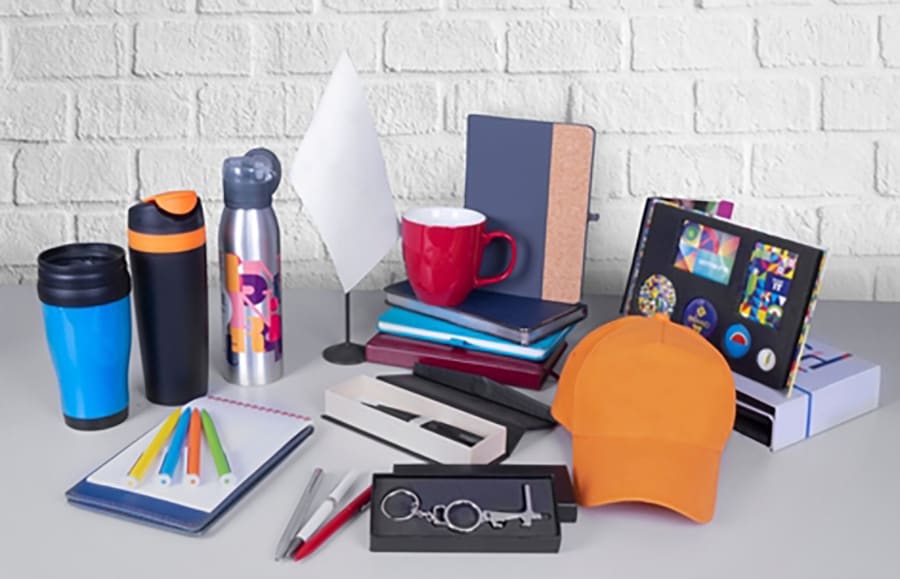 Logo: go large
Logo: go large
Display your logo or brand name Prominently on giveaway items.That way your recipient will recall at a glance. It can be cheaper and easier than you think to add customisation to items like Calendars or Mouse Mats that will claim prominent real estate on their desks.
Make it useful
Handy customised items will be kept and used, serving as a long term reminder of your brand. A Wireless Charger, Power Bank, Notebook, Totebag or Water Bottle will stay useful, stay out of landfill and stay in the front of their minds.
Bridge the online and physical worlds
A physical reminder of your brand is valuable, but you can make that item work even harder when you use it to drive your recipient online. Encourage social media sharing by including handles, hashtags, or QR codes on your printed promo items..
By following these tips, you can effectively use promotional materials to set yourself apart while networking, and pass on a physical reminder of who you are and what you do.


